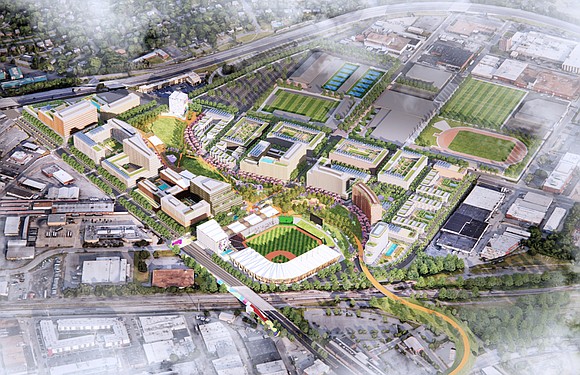Ambitious development plan for Diamond District gains city council approval
Jeremy M. Lazarus | 9/29/2022, 6 p.m.
Done deal.
With an 8-0 vote, City Council on Monday approved the projected $2.4 billion Diamond District in North Side that promises a new baseball stadium plus offices, hotels, homes, apartments, retail space, a public park and a gusher of construction and permanent jobs targeted to city residents.
The huge public-private development easily cleared its first hurdle with support coming even from two members who had initially failed to endorse it, Kristen M. Nye, 4th District, and Reva M. Trammell, 8th District.
Ms. Trammell, who initially indicated she might vote against the project to protest the failure of city voters to support a $562 million casino resort for her South Side district, turned around and cast her vote for the project, saying, “I can’t be selfish, it’s for the good of the city.”
Council Vice President Ellen F. Robertson was absent.
A jubilant Mayor Levar M. Stoney applauded the vote that he said would “deliver the largest economic development project for the city, but also the most equitable, a project that will provide quality jobs, affordable housing and public amenities benefiting all.”
Before the vote, more than a dozen people spoke, most in support, including union members who are happy that a significant share of the work is to be done by organized labor and city residents and that union wages are to prevail.
“Vote yes for forward progressing, yes for minority business owners, yes for a Richmond we can all be proud of,” said Shemicia Bowen, a partner in the Richmond Black Restaurant Experience that will play a role in the retail and hospital elements.
The vote clears the way for City Hall to finalize the deal that council also must approve with the selected development team, RVA Diamond Partners, a multiracial business coalition led by Washington-based Republic Properties Corp., Henrico County-based Thalhimer Realty Partners and Chicago-based Loop Capital.
Representatives of the team were surprised to gain unanimous support for what one called “an incredible opportunity.”
The deal hinges on the project securing more than $100 million in capital to finance the infrastructure and the new stadium to replace the aging Diamond, home of the Richmond Flying Squirrels, that Major League Baseball insists
must be ready for opening day in 2025 — the reason Loop Capital, the nation’s largest Black-owned investment bank, is on the team.
Though unmentioned Monday night, Richmond, according to the term sheet, will pledge virtually all of the taxes the project is to generate to repay that debt, with the general fund benefiting only after that happens.
First envisioned more than 17 years ago, the development is to take place on 67 acres bounded by Arthur Ashe Boulevard, Interstate 64-95, Robin Hood Road, Hermitage Road and railroad tracks, which in past years was devoted to city and school system shops and offices.
Seeking to build on the existing boom in Scott’s Addition, the project is to be completed in four phases that could take 15 years or more.
The first phase alone is to include a projected $627 million in development, including the replacement stadium that is to accommodate 10,000 people and serve as a concert and events venue when the Flying Squirrels and Virginia Commonwealth University’s team are not playing. During the public comment period, one speaker expressed disappointment that the stadium would not accommodate women’s softball.
The first phase involves 21 acres of city land for which the development has agreed to pay $16 million, and the six- acre Sports Backers Stadium the team is to buy from VCU. While concern was expressed that the creation of the district will mean demolition of the Arthur Ashe Jr. Athletic Center, that action would not happen until the fourth phase is ready to go.
Along with the stadium, the first phase is to include a 180-room hotel; a 4-acre public park that would grow to 11 acres; 1,134 new apartments, 184 of which must for lower-income residents and 39 of which must be for public housing residents; 92 duplex-style for-sale homes, 18 of which must be affordable for lower-income residents.
Over time, developers say they project adding 1,700 more apartments; 65 more homes; two office buildings and another hotel. Retail space also is projected to triple, with the project also expanding parking from an initial 1,700 spaces to nearly 7,000.
In addition, the team is proposing to development a construction trades training center in South Side to help more city residents secure jobs on this project and others to follow.







